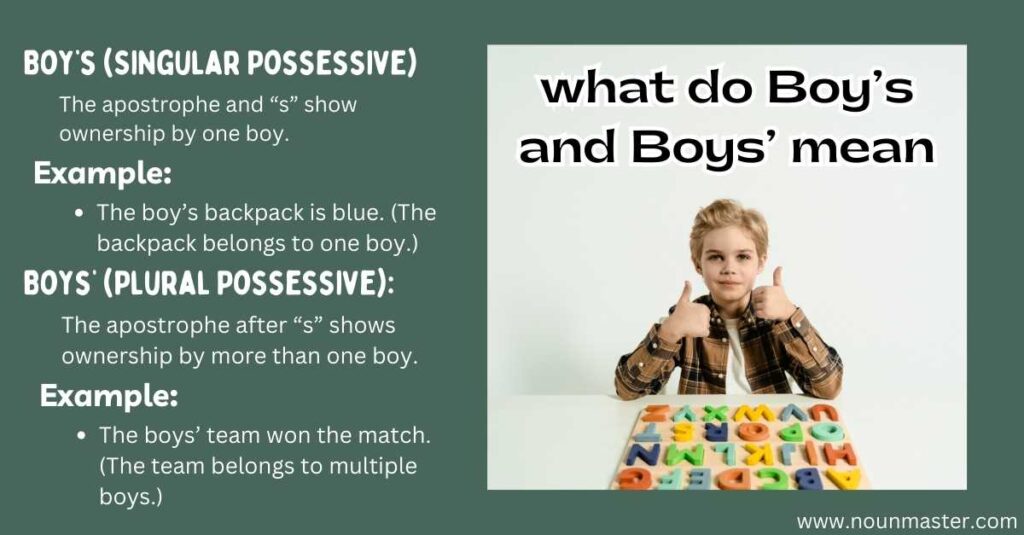Ever come across boy’s and boys’ and wondered which one to use? This small punctuation mark—the apostrophe—can make a big difference in meaning!
Understanding the difference between these two forms is essential for clear and grammatically correct writing.
In this article, we’ll break it all down, from definitions and usage to easy examples that make everything crystal clear.
Key Differences at a Glance
| Form | Usage | Example |
|---|---|---|
| Boy’s | Singular possessive | The boy’s backpack is new. |
| Boys’ | Plural possessive | The boys’ backpacks were left on the floor. |
What Do Boy’s and Boys’ Mean?

How to Choose the Right Form
The key to using these forms correctly lies in identifying whether you’re talking about one boy or multiple boys:
- If you’re referring to one boy owning something, use boy’s.
- Example: The boy’s bike is parked outside.
- If you’re referring to something owned by multiple boys, use boys’.
- Example: The boys’ locker room is on the second floor.
Quick Tip for Apostrophe Placement
- Singular nouns: Add an apostrophe + “s” (boy’s).
- Plural nouns already ending in “s”: Add only an apostrophe (boys’).
Tomorrow or Tommorrow: Which Spelling is Correct?
Common Mistakes to Avoid
Confusing Plural and Possessive:
- Incorrect: The boys hat was missing.
- Correct: The boy’s hat was missing. (Belongs to one boy.)
- Correct: The boys’ hats were missing. (Belongs to multiple boys.)
Adding Extra Apostrophes:
- Incorrect: The boy’s’ books were on the desk.
- Correct: The boys’ books were on the desk.
How to Remember the Difference
- If it’s one boy, use boy’s.
- If it’s more than one boy, use boys’.
Journeys or Journies: Which One is Correct?
Examples for Clarity
Understanding the difference between singular and plural possessives can make your writing clearer and more precise. Let’s break it down with examples:
| Type | Explanation | Examples |
| Boy’s (Singular Possessive) | Shows possession for one boy. | The boy’s hat blew off in the wind.I found the boy’s notebook under the desk. |
| Boys’ (Plural Possessive) | Shows possession for more than one boy. | The boys’ classroom was decorated for the holidays.The coach praised the boys’ efforts after the game. |
A Simple Memory Trick:
- If it’s one boy, think boy’s.
- If it’s more than one boy, think boys’.
Final Thought
Mastering boy’s vs. boys’ is all about understanding whether you’re talking about one boy or several boys. Pay attention to the apostrophe’s placement, and you’ll never mix them up again.
Whether it’s the boy’s favorite toy or the boys’ shared adventure, using these forms correctly ensures your writing is both polished and precise.
Ninety or Ninty: Which Spelling is Correct?







